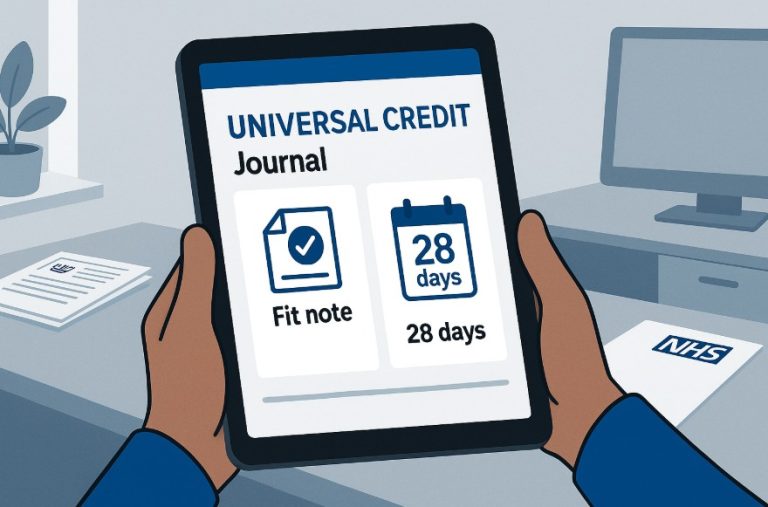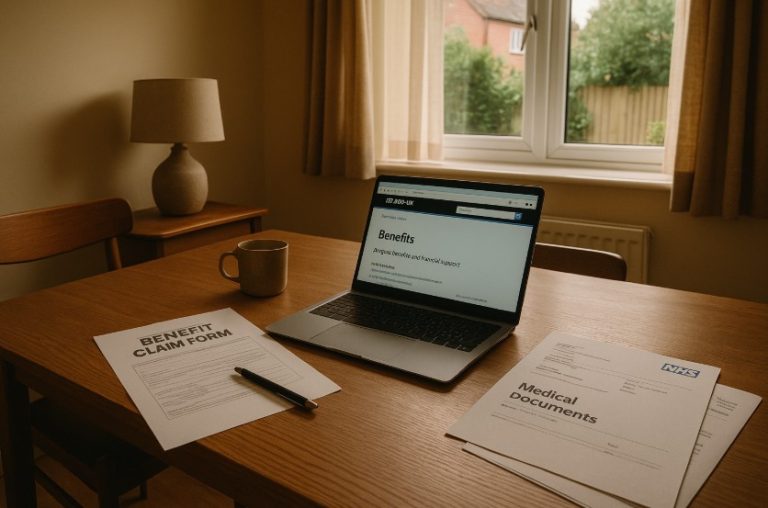Understanding the rules around Personal Independence Payment (PIP) is essential, especially when it comes to holidays abroad.
The Department for Work and Pensions (DWP) has specific guidelines in place that PIP claimants must follow if they plan to leave the country.
Failing to comply could lead to benefit suspension, fines, or even prosecution. This guide explores the key DWP holiday rules every PIP recipient should be aware of to maintain their entitlement.
What Are The DWP Holiday Rules For PIP Claimants In The UK?
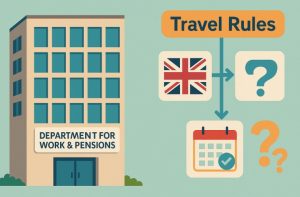
Personal Independence Payment (PIP) is a non-means-tested benefit for individuals who have long-term physical or mental health conditions and struggle with everyday tasks or mobility.
It provides financial support to help with the additional costs that come with a disability.
The Department for Work and Pensions (DWP) administers this benefit and sets clear rules for claimants, particularly around travel.
One of the most important regulations relates to time spent outside the United Kingdom. While short holidays usually do not impact entitlement, longer absences might result in benefit suspension.
PIP claimants must be aware that travelling outside of the UK for more than a specific duration may raise questions about continued eligibility.
These rules are designed to ensure that only individuals who meet the conditions of residence and daily living or mobility needs continue receiving payments.
How Long Can PIP Claimants Go On Holiday Without Affecting Their Benefits?
The DWP allows PIP claimants to go on holiday for a period of up to four weeks without affecting their benefit, provided that their medical condition remains unchanged during this period.
If the travel duration exceeds four weeks, the DWP must be informed. Claimants must explain the length of their stay, their destination, and the reason for travel.
If a holiday lasts more than four weeks, the DWP will assess whether the claimant still meets the criteria for receiving PIP.
Even though a temporary absence may be acceptable in some cases, extended stays could lead to a reassessment or pause in payments.
The following table outlines how travel duration affects eligibility:
| Travel Duration | DWP Notification Needed | Potential Impact on PIP |
| 1 to 4 weeks | Recommended | Usually no effect |
| Over 4 weeks | Required | Possible suspension or review |
| 12 months or longer | Required | Likely termination of entitlement |
What Changes Must PIP Claimants Report To The DWP Before Travelling?
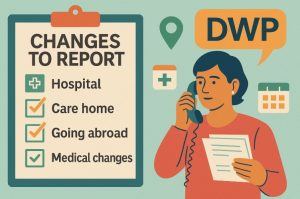
When receiving Personal Independence Payment (PIP), it’s important to understand that the Department for Work and Pensions (DWP) expects full transparency from claimants regarding any change in circumstances.
While going on holiday might seem like a personal matter, if the duration or purpose of the trip affects eligibility for benefits, the DWP requires official notification.
If a PIP claimant is planning to travel abroad for more than four weeks, this must be reported to the DWP in advance. The reason is that PIP entitlement is based partly on the assumption that the claimant is ordinarily resident in the UK, and extended absences may call this into question.
Additionally, DWP uses these details to reassess whether the claimant’s daily living or mobility needs are still valid while away from their usual environment.
What Information Must Be Shared With The DWP Before Travelling?
When notifying the DWP about a holiday or any international travel that extends beyond four weeks, the following information should be provided:
- The date of departure from the UK
- The intended return date
- The country or countries being visited
- The reason for travel, such as holiday, medical treatment, or family visit
- Whether any change in condition is anticipated during the trip
The DWP will use this information to determine whether the claimant’s entitlement to PIP remains valid during the period of absence.
If the purpose of travel is for necessary medical treatment or a compassionate reason, such as attending a funeral or visiting a terminally ill relative, the department may apply flexibility depending on the circumstances.
Why Does DWP Require Notification?
The DWP requires notification to ensure that claimants still meet the eligibility criteria, which are based on:
- Residency in the UK
- Ongoing daily living or mobility challenges due to a physical or mental health condition
- The duration of these challenges (typically expected to last at least nine months)
Any prolonged absence abroad can raise concerns about these eligibility aspects. For instance, if someone is travelling abroad for an extended time and is not receiving care or facing reduced daily challenges, this could imply that they no longer qualify under the original conditions of their award.
Full List Of Reportable Changes
Travel is just one of many changes in personal circumstances that the DWP requires PIP claimants to report. Below is a comprehensive table outlining both travel-related and non-travel-related changes that must be disclosed:
| Type of Change | Description |
| Planning to go abroad for more than 4 weeks | Any travel exceeding 4 weeks may affect entitlement and must be reported |
| Increased or decreased care needs | Changes in how much help you need for daily tasks or mobility |
| Diagnosis of terminal illness | If life expectancy is less than 12 months, the DWP needs to reassess |
| Admission to hospital, care home, or hospice | Length of stay and care received could affect benefit eligibility |
| Going into a residential school or college | Residential status may affect ongoing entitlement |
| Being taken into foster care or local authority | Change in legal responsibility can impact benefit conditions |
| Imprisonment or legal detention | Benefits are paused or withdrawn during time in custody |
| Change in immigration status | Particularly for non-British/Irish citizens; residency requirements apply |
| Receiving foreign benefits | Benefits from EU, EEA, Switzerland, or other nations must be declared |
| Partner or parent receiving foreign benefits | Their benefit status can influence your own entitlement |
These changes can influence not just whether you continue to receive PIP, but also the rate at which it is paid. The DWP notes that depending on the type of change, your PIP award could:
- Increase (e.g., worsening of condition or new diagnosis)
- Decrease (e.g., improvement in condition)
- Stay the same
- Stop altogether
Failing to report any of these changes could lead to significant consequences including overpayment recovery, penalties, or even court action for benefit fraud. It is always in the claimant’s best interest to contact the DWP immediately when a relevant change occurs.
Changes That Do Not Need To Be Reported
While many changes must be reported, others do not affect your eligibility or payment and therefore do not need to be formally declared. These include:
- Changing your name
- Updating your doctor or health professional
- Changing your home address (though it’s advisable to keep records current)
Even though these do not affect the PIP decision directly, keeping your contact and personal information updated helps ensure that important DWP correspondence reaches you without delay.
What Happens If A PIP Claimant Fails To Report A Holiday?
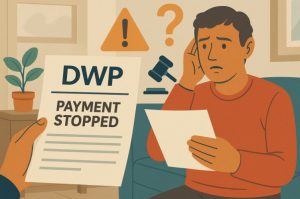
Failure to notify the DWP of an extended holiday or other significant changes in circumstances can result in serious consequences.
The DWP conducts audits and assessments to ensure claimants continue to meet the qualifying conditions.
If a claimant fails to report a required change:
- Their PIP payments may be suspended or stopped
- They may be asked to repay overpaid benefits
- They could face a financial penalty
- Legal action, including court prosecution, may be taken for benefit fraud
These rules are enforced to ensure the system remains fair and is not misused. Providing accurate and timely updates is critical in maintaining your benefits.
How Should PIP Claimants Notify The DWP About Holidays Abroad?
To report a planned holiday or any other relevant change, claimants should contact the PIP enquiry line. It is advisable to do so well before the travel date to allow for proper processing and guidance.
The claimant should be ready to provide the following:
- National Insurance number
- Destination country
- Departure and return dates
- Purpose of travel (e.g., holiday, medical, family)
The DWP may also request supporting documentation depending on the circumstances. The process is relatively straightforward and ensures compliance with government guidelines.
Below is a quick reference guide:
| Information Required | Description |
| NI Number | To verify claimant’s identity |
| Travel Dates | Departure and expected return |
| Country of Destination | Required for assessing residence criteria |
| Reason for Travel | Holiday, treatment, visiting relatives etc. |
PIP Enquiry Line:
Telephone: 0800 121 4433
Opening Hours: Monday to Friday, 9:00 am to 5:00 pm
Do DWP Holiday Rules Apply Differently Across Countries?
Yes, the rules may vary depending on the destination. Travelling to countries within the European Union, European Economic Area (EEA), or other countries with reciprocal benefit agreements with the UK may not be treated the same way as travel to countries without such agreements.
Claimants who are not British or Irish citizens must pay special attention to their immigration status and how it may affect residency-based eligibility rules.
Those who receive pensions or benefits from other countries, or have family members doing so, must also report this to the DWP.
Travel to certain countries could require more documentation or lead to additional scrutiny regarding the duration of stay and eligibility for continuing support.
What Other Life Changes Must Be Reported To DWP Besides Travel?
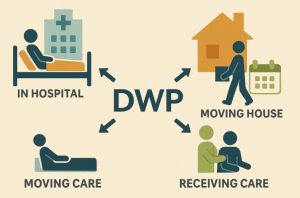
The DWP expects claimants to keep them informed about a wide range of life changes, not just international travel. These changes can influence benefit amounts, eligibility, or both.
Life events that must be reported include:
- A change in health that affects care or mobility needs
- Admission to or discharge from care homes, hospitals, or hospices
- Start or end of education at a residential facility
- Imprisonment or detention
- Receiving other government benefits
- A change in family circumstances that may affect benefits
In contrast, updating details such as a new address, telephone number, or healthcare provider is not mandatory for benefit assessment but is still recommended for administrative accuracy.
How Can PIP Claimants Protect Their Benefits When Planning Holidays
Personal Independence Payment (PIP) is a vital financial support system for individuals with long-term health conditions or disabilities. As a benefit that depends on a claimant’s functional needs and residency in the UK, careful consideration is needed when planning holidays abroad.
While going on holiday does not automatically disqualify someone from receiving PIP, there are specific actions claimants should take to protect their payments and stay within Department for Work and Pensions (DWP) regulations.
Failure to take these steps could lead to delays in payment, reviews of eligibility, or in more serious cases, suspension or termination of benefits. Planning ahead and maintaining open communication with the DWP is the best way to ensure uninterrupted support.
Notify The DWP In Advance For Extended Holidays
The first and most important step is informing the DWP if the planned holiday will last more than four weeks. The DWP requires this notification so they can assess whether the travel may impact entitlement based on the claimant’s continued residence and support needs.
Even if the trip is shorter than four weeks, it’s recommended to inform the DWP if there are any doubts about how the trip might interact with your condition or care requirements.
This is especially important for individuals with fluctuating conditions or if the trip involves activities that differ significantly from your normal daily routine.
Gather And Provide Accurate Travel Information
When reporting travel to the DWP, claimants should ensure all information is clear and correct. The DWP will typically ask for:
- Date of departure and expected return
- Country or countries being visited
- Reason for travel (holiday, medical treatment, family matters)
- Any anticipated changes in condition or care during the trip
Providing full and accurate details prevents misunderstandings or future claims of non-disclosure. Keeping a written record of the report, including the date and time of the phone call or correspondence, is highly advisable.
Understand The Four-Week Limit
The DWP has established a general rule that claimants can be absent from the UK for up to four weeks without it affecting their PIP payments. Any stay beyond this period must be reported and may trigger a reassessment.
There are exceptions for specific circumstances, such as medical treatment abroad or emergencies. However, these situations must be discussed with and approved by the DWP in advance. If you’re uncertain whether your trip qualifies for an exemption, it’s essential to seek advice before travelling.
Keep Documentation For Future Reference
Claimants should retain all documents related to their holiday, including:
- Flight or travel bookings
- Accommodation receipts
- Letters from healthcare professionals if travelling for treatment
- Any DWP letters confirming approval or guidance on extended travel
This documentation can be vital in the event of a future dispute, review, or reassessment. If the DWP questions a trip or asks for clarification months later, these records can be used to support the claimant’s case.
Maintain Accurate Contact Information
Even when travelling, it’s important that the DWP can still reach the claimant. Ensuring that the department has up-to-date contact information such as:
- A current mobile number
- A reliable email address
- A postal redirection service if needed
Staying contactable allows the DWP to send updates, requests, or warnings regarding the benefit status during the claimant’s absence from the UK. It also ensures no critical correspondence is missed.
Avoid Travel That Could Misrepresent Your Needs
While on holiday, claimants should be cautious about engaging in activities that might appear inconsistent with the information provided to the DWP about their condition.
For example, if someone has claimed mobility issues but is later seen hiking or engaging in strenuous activities abroad, this could prompt a review or investigation.
It’s important to remember that benefits like PIP are not assessed solely on medical diagnosis but on how the condition affects daily life.
Claimants should be prepared to explain their activities and ensure that any temporary improvements while away do not reflect permanent changes in their condition.
Plan Around Review Dates Or Assessments
If a review or reassessment of a PIP award is due soon, it is best to plan travel around this schedule. Missing a review date, failing to submit requested information, or not attending a scheduled consultation while abroad can lead to delays or loss of benefits.
Claimants expecting a PIP review should:
- Check dates of past awards or letters from DWP
- Contact DWP to confirm if a review is pending
- Avoid booking travel during periods when responses may be required
Seek Guidance From A Benefits Adviser If Unsure
Planning a holiday as a PIP claimant can raise several questions, especially if the trip is long, includes multiple countries, or involves medical treatment abroad. If in doubt, seeking professional advice from a welfare rights organisation or benefits adviser can help.
A benefits adviser can:
- Clarify which travel rules apply to your specific circumstances
- Help report changes to the DWP effectively
- Assist in challenging any adverse decisions related to travel
Are There Any Exceptions Or Special Circumstances For PIP Travel Rules?
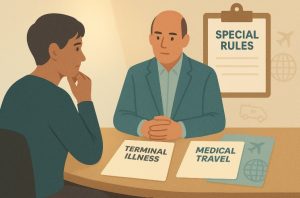
There are special provisions in place for claimants under specific conditions. Individuals diagnosed with a terminal illness may be eligible for PIP under the “special rules for end of life,” which may include faster processing and higher rates of payment.
In some cases, temporary absences beyond the four-week limit may be allowed if justified. These exceptions must be discussed and agreed upon with the DWP before the trip.
For example, those receiving treatment abroad or attending a family emergency may be assessed differently.
However, each case is handled individually, and supporting documentation is generally required.
It is strongly advised that claimants contact the DWP and explain the situation in full before finalising travel plans.
Conclusion
Personal Independence Payment offers critical financial support to many in the UK. However, that support comes with responsibilities.
Understanding the DWP holiday rules, planning travel carefully, and reporting required changes in a timely manner are essential steps to protect your benefits.
With the right preparation, claimants can enjoy their holidays without risking financial disruption or legal issues.
FAQs about PIP travel and DWP rules
Can I go on multiple holidays in a year while on PIP?
Yes, as long as each trip is under four weeks and your condition doesn’t change. Inform DWP if any trip exceeds that duration.
Will my PIP stop if I go on holiday for 5 weeks?
It might. Absences longer than four weeks must be reported. The DWP will decide based on your situation whether to pause or stop your payment.
Do I need to report weekend breaks abroad?
No, short trips under four weeks do not require formal notification. However, you should inform the DWP if your care needs or condition change during your trip.
What documents do I need to give DWP for a holiday?
Typically, no documents are required unless asked. But have your travel dates, country, and reason for travel ready when calling.
Is my PIP affected if I go to an EU country?
Possibly. EU travel is subject to benefit coordination rules. If you or a family member receives EU benefits, this must be reported.
Can I lose PIP permanently if I fail to report travel?
Yes, if the DWP sees it as deliberate non-disclosure. You may also be fined or prosecuted under benefit fraud legislation.
What happens if my health condition worsens while abroad?
You should inform the DWP as soon as possible. If your care needs increase, this may entitle you to higher PIP rates upon review.

